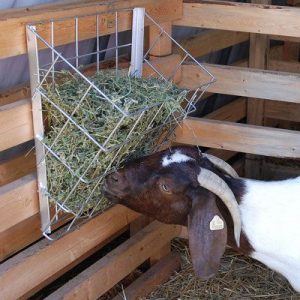When it comes to raising healthy and productive goats, understanding their nutritional needs is paramount. Goats are versatile and hardy animals, but like all livestock, they require a balanced diet to thrive. This ultimate guide to goat nutrition covers the essentials you need to ensure your goats remain healthy, happy, and productive.

Goats, being ruminants, have a unique digestive system that allows them to process a variety of plant materials. Their diet primarily consists of forage, which includes grasses, legumes, and browse such as shrubs and leaves. High-quality forage should be the foundation of a goat’s diet. Pasture grazing is ideal as it provides fresh, diverse, and nutrient-rich plants. However, in areas where pasture is not available year-round, providing hay is essential. Alfalfa hay is particularly beneficial due to its high protein content, but it should be balanced with other types of hay to prevent digestive issues.

In addition to forage, goats require a source of concentrated nutrients to meet their energy needs, especially during periods of high production such as lactation or growth. Grain supplements can be used, but they should be given in moderation to prevent digestive disorders like acidosis. Common grains include oats, corn, and barley, often provided in combination with a protein source such as soybean meal. It’s crucial to tailor the grain portion of the diet based on the specific needs of your goats, considering factors like age, weight, production stage, and overall health.

Besides goats nutrition, you should Note that our company can help you to start by giving you all the necessary information you need to get started if not yet in the business. Please check our online shop, we have all the standard business proposals for different capacities at very a cheap price made by the best agricultural specialists as well as Standard design plans that are made by the best agricultural architects around the globe. please visit our online shop now using the links below to witness by yourself
Design plans (FARM HOUSE DESIGNS – Kimd Construction & Farm Consultants)
Business plans (BUSINESS PLANS & PROPOSALS – Kimd Construction & Farm Consultants)
Welcome back from visiting our shop, hope you have placed your order for any of our products or you can place it after navigating more of our informative articles.
So let’s continue with our article!
Minerals and vitamins are also vital components of a goat’s diet. Goats need a balanced mineral supplement that provides essential elements like calcium, phosphorus, magnesium, and salt. Trace minerals such as copper, zinc, and selenium are also critical, but care must be taken with their levels as over-supplementation can be toxic. A loose mineral mix specifically designed for goats is often the best choice, ensuring they get the right balance without the risk of overconsumption. Vitamin requirements are generally met through good-quality forage and sunlight exposure, but during times of limited forage availability or for indoor-kept goats, additional vitamin supplementation might be necessary.
Water is another fundamental aspect of goat nutrition. Clean, fresh water should always be available. Goats are sensitive to water quality, and inadequate or dirty water can lead to reduced intake and health issues. In hot weather or during lactation, goats’ water needs increase significantly, so it’s essential to monitor their intake and ensure ample supply.

Feeding practices should also consider the prevention of common nutritional disorders. Bloat, enterotoxaemia, and urinary calculi are some conditions that can arise from improper feeding. Gradually introducing dietary changes, providing sufficient roughage, and ensuring proper mineral balance can help prevent these issues. Regularly monitoring your goats for signs of nutritional deficiencies or imbalances is key. Signs such as poor coat condition, weight loss, or decreased milk production can indicate dietary issues that need addressing.

Understanding the basics of goat nutrition and applying this knowledge through careful diet planning and management will significantly impact the health and productivity of your herd. Whether you’re raising goats for milk, meat, fiber, or simply as pets, providing a balanced diet that meets their nutritional needs is the cornerstone of successful goat husbandry. By prioritizing high-quality forage, appropriate supplements, clean water, and vigilant health monitoring, you can ensure your goats lead healthy and fulfilling lives.
Sharing is caring!




